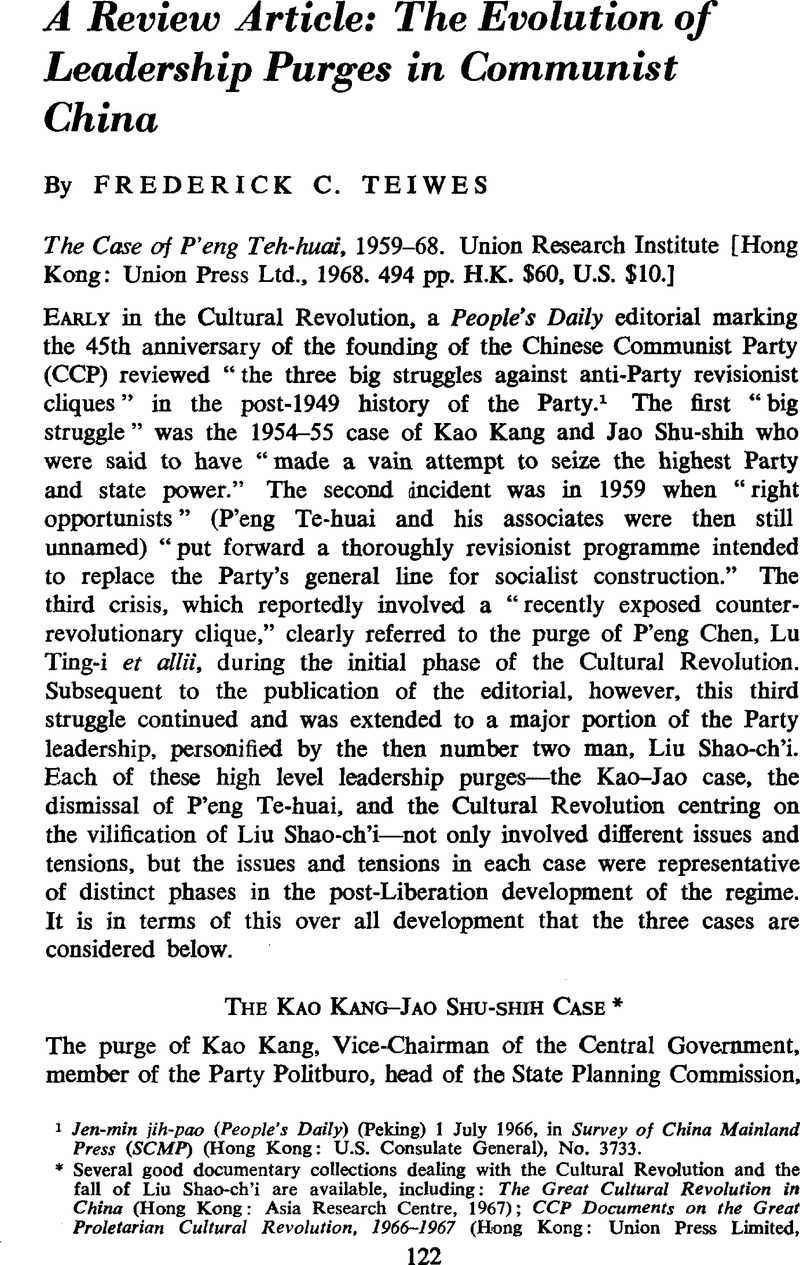Article contents
The Evolution of Leadership Purges in Communist China
Published online by Cambridge University Press: 17 February 2009
Abstract

- Type
- Review Article
- Information
- Copyright
- Copyright © The China Quarterly 1970
References
1 Jen-min jih-pao (People's Daily) (Peking) 1 07 1966Google Scholar, in Survey of China Mainland Press (SCMP) (Hong Kong: U.S. Consulate General), No. 3733.Google Scholar
* Several good documentary collections dealing with the Cultural Revolution and the fall of Liu Shao-ch'i are available, including: The Great Cultural Revolution in China (Hong Kong: Asia Research Centre, 1967)Google Scholar; CCP Documents on the Great Proletarian Cultural Revolution, 1966–1967 (Hong Kong: Union Press Limited, 1968)Google Scholar; and Collected Works of Liu Shao-ch'i, 1958–1967 (Hong Kong: Union Press Limited, 1968).Google Scholar No convenient compilation of materials relevant to the purge of Kao Kang and Jao Shu-shih is available, but the official CCP view of the case is summarized in the communiqué and resolutions of the March 1955 National Party Conference, translated in Current Background (CB) (Hong Kong), No. 324.Google Scholar
2 The Fourth Plenum of the Seventh Central Committee in February 1954 marked the defeat of Kao and Jao. See New China News Agency (NCNA) (Peking), 18 02 1954, in SCMP No. 751.Google Scholar
3 Significant personnel changes also took place in Shantung Province, but the East China region otherwise was little affected in this regard.Google Scholar
4 CB No. 324 (emphasis added).Google Scholar
5 Peking Review, 1 10 1959.Google Scholar
6 See the fascinating Red Guard account of Kao's alleged approach to T'ao Chu in SCMP No. 3962.Google Scholar
7 See Radio Shanghai, 9 February and 20 March 1968.Google Scholar
8 Translated in The Case of Peng Teh-huai, pp. 7–13.Google Scholar
9 Interestingly enough, P'eng later confessed to a conversation with Chang Wen-t'ien in which he (P'eng) referred to Mao with the comment that “the first emperor of any dynasty in the past was always strong-handed and brilliant.” See ibid. p. 36.Google Scholar
10 See P'eng's comments to the meeting of the North-west Group at Lushan in ibid. pp. 1–5.Google Scholar
11 Ibid. p. 25 (emphasis added).
12 See my article “The Purge of Provincial Leaders 1957–1958,” The China Quarterly, No. 27 (07–09 1966).Google Scholar
13 It could be cogently argued that the erosion of the policy consensus actually began with Mao's July 1955 decision to speed-up the pace of agricultural co-operativization. This would not alter my basic analysis since the Kao-Jao case antedated that decision and the purge of P'eng would remain the culmination of this process of erosion.Google Scholar
14 See Decision of the Central Committee of the CCP Concerning the Great Proletarian Cultural Revolution (Peking: Foreign Languages Press, 1966), Articles 3, 9, 11 and 13.Google Scholar
15 This is not to deny that specific policy issues may have been important factors in individual purges. For example, it is perfectly conceivable as some have suggested that Lo Jui-ch'ing's fall was due in part to advocacy of a rapprochement with the Soviet Union in view of the Vietnam war. Even here, however, the accusations against Lo focused on his promotion of professionalism within the PLA and did not mention any possible dispute over foreign policy.Google Scholar
16 While the possibility remains that differences over economic policy and foreign policy were the “real” issues behind the Cultural Revolution, the course of the movement argues strongly to the contrary. There was little effort to develop coherent economic or foreign policies during the Cultural Revolution. Indeed, there is much evidence of an unwillingness to assume responsibility for making policy in these and other areas, a very unusual situation if the conflict was primarily over different policy views.Google Scholar
17 See Mao's report to the Third Plenum of the Seventh Central Committee, 6 06 1950, in CB, No. 1.Google Scholar
18 For a fascinating description of his preoccupations and fears, see Mao's interview with Edgar Snow in The New Republic, 27 02 1965.Google Scholar
19 At the end of 1964, Chou En-lai did announce that the Third Five Year Plan would begin in 1966. See Main Documents of the First Session of the Third National People's Congress of the People's Republic of China (Peking: Foreign Languages Press, 1965), p. 17. However, the plan was not published and apparently never became operative.Google Scholar
20 While it could be hypothesized that the opposition of “anti-Maoists” blocked radical economic policies, the failure of Mao to undertake such policies once the Cultural Revolution was under way suggests that he too was hesitant to initiate drastic changes in the cautious approach to the economy.Google Scholar
21 Radio Kunming, 24 August 1967.Google Scholar
22 For example, Hsi Chung-hsun, Vice-Premier and Secretary-General of the State Council, was quietly ousted in 1962, and Li Wei-han, director of the Central Committee's united front department, dropped from view in late 1964 when “capitulationism in united front work” was criticized.Google Scholar
- 1
- Cited by




